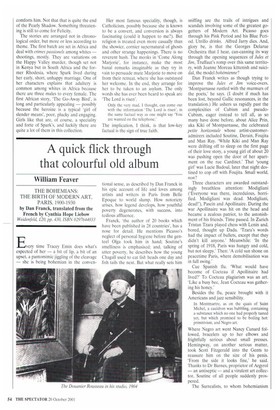Ghosts and sharp outlines
Gab riele Annan
THE COMPLETE SHORT STORIES by Muriel Spark Penguin Viking, £20, pp. 416, ISBN 0670911720 Inheritance, faith, suppressed passion; irony, simplicity, black coniedy: these are Muriel Spark's trademarks.' Andrew Motion wrote that in a review of Spark's last novel, Aiding and Abetting (about Lord Lucan), and it's quoted on the dust jacket of The Complete Short Stories. One might add wit and cleverness to the trademarks; and heartlessness. As for Spark's simplicity, that is a bit suspect. Few of the characters, few of the happenings in this hefty new volume are what at first they seem; and that's one of the points her fiction makes.
There are 41 stories: not a book to be read at a sitting; but not a book to have by one's bedside either: many of the stories are too spooky for the insomniac small hours. There are lots of ghosts. Quite often they tell the story in the first person, In 'The Portobello Road', the narrator is surprised by the behaviour of an old friend when she greets him across the market stalls. 'He looked very ill, although when I had said "Hallo, George" I had spoken friendly enough.' The next paragraph begins, 'I must explain that I departed this life five years ago.' Very casual: being a ghost is just as run-of-the-mill as being a civil servant. And then you read on and discover that the reason she's dead is that George murdered her.
The neatest, wittiest, shortest, cleverest of the ghost stories is 'The Pearly Shadow'. The Shadow is a hallucination suffered first by a patient in a psychiatric hospital, then caught — like flu — by a nurse. The psychiatrist in charge of them is Dr Felicity Grayling. Spark is wickedly sharp at defining people by their names: not in a rollicking, Dickensian way, but so that you know immediately where they come from, what kind of school they went to, how they will speak. (Always on the watch for snobbery, she pounces when she sees it. There's a story called The Snobs' and even a ghost who is 'a terrible snob'.) Felicity puts the nurse on tranquillisers. The Shadow comes to her surgery to complain: if the nurse were to take an overdose, he says, it would kill him. 'You won't feel a thing,' Felicity
comforts him. Not that that is quite the end of the Pearly Shadow. Something threatening is still to come for Felicity.
The stories are arranged not in chronological order, but more or less according to theme. The first batch are set in Africa and deal with crimes passionels among whites — shootings, mostly. They are variations on the Happy Valley murder, though set not in Kenya but in South Africa and the former Rhodesia, where Spark lived during her early, short, unhappy marriage. One of her characters explains that adultery is common among whites in Africa because there are three males to every female. The first African story, 'The Go-Away Bird', is long and particularly appealing — possibly because the heroine is a typical 'girl of slender means', poor, plucky and engaging. Girls like that are, of course, a speciality and forte of Spark's, and luckily there are quite a lot of them in this collection. Her most famous speciality, though, is Catholicism, possibly because she is known to be a convert, and conversion is always fascinating (could it happen to me?). But religion is treated even more casually than the showier, cornier supernatural of ghosts and other strange happenings. There is no reverent hush. The monks in 'Come Along Marjorie', for instance, make the most banal remarks imaginable as they try in vain to persuade mute Marjorie to move on from their retreat, where she has outstayed her welcome, In the end, they arrange for her to be taken to an asylum. The only words she has ever been heard to speak are The Lord is risen'.
Only the very mad, I thought, can come out with the information `The Lord is risen', in the same factual way as one might say 'You are wanted on the telephone.'
The implication, I think, is that low-key factual is the sign of true faith.



























































































 Previous page
Previous page